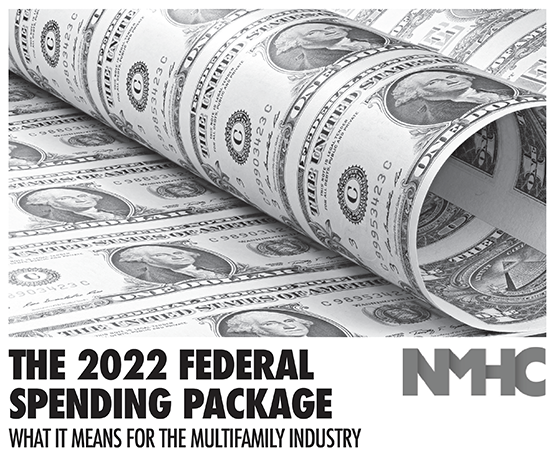What the 2022 Federal Spending Package Means for the Multifamily Industry

President Biden signed the federal omnibus legislation into law on March 15 that will allocate funding to various parts of the government. Each time a government spending bill is brought up, NMHC remains highly engaged because its passage – or lack thereof – determines the funding for several key Departments, Agencies and programs critical to our industry.
This year’s spending package includes 12 different bills that set forth $1.5 trillion in discretionary resources. Key highlights for our industry include:
- $53.7 billion in HUD funding – an increase of $4 billion above fiscal year 2021—which includes an expansion of housing choice vouchers and increased funding for key programs to develop and maintain affordable housing.
- Industry-important extensions and modifications of both the EB5 and H-2B programs.
- A reauthorization of the NMHC-supported Violence Against Women Act (VAWA) that includes key housing provisions.
The legislation also provides for funding related to infrastructure, broadband, and housing access and opportunity that could prove impactful to our industry. Use the drop-down feature below for a deep dive into key inclusions and NMHC’s viewpoint.
Included HUD funds allocate $10 billion for Community Planning and Development, which includes $3.3 billion for Community Development Block Grants (CDBG) and $1.5 billion for the HOME Investment Partnerships Program.
This legislation also sets aside a 75 percent increase via the HUD budget to the Choice Neighborhoods Initiative, which aims to revitalize low-income housing and distressed communities.
NMHC Viewpoint: Our nation needs to build an average of 328,000 new apartment homes each year through 2030 just to keep up with current demand—and in doing so, help ease the housing affordability crisis felt nationwide. We must deploy a holistic, exhaustive approach to address this challenge. But NMHC sees great value in both the CDBG and HOME programs to help us move the needle.
As part of HUD’s budget, $27.4 billion has been set aside for tenant-based rental assistance and $13.9 billion for project-based rental assistance.
NMHC Viewpoint: The public-private Section 8 housing choice voucher program could be the nation’s most effective affordable housing and community development tool. However, it is plagued with inefficiencies, onerous regulatory requirements and a flawed funding system. NMHC is pleased to see an increase in funding for this critical program, but lawmakers must also programmatic inefficiencies to ensure the program’s success by attracting private housing providers’ participation.
Within the rural funding, the legislation invests over $550 million in the expansion of broadband service to provide among other provision, “economic development opportunities.” This is in addition to the $2 billion previously provided in Infrastructure Investment and Jobs Act.
As part of the Federal Communications Commission (FCC)budget,the legislation also includes an $8 million increase from the FY 2021 budget, bringing the Commission’s budget for this year to $382 million. The stated goal of these funds is “to support efforts to expand broadband access, improve the security of U.S. telecommunications networks, and administer billions in COVID relief programs.”
NMHC Viewpoint: NMHC has worked diligently over the past several years to advocate for funding and policies that will help breakdown the digital divide—particularly in our most underserved communities. As these funds are deployed, NMHC will continue to work with the policymakers to ensure multifamily properties receive the resources needed to ensure our residents maintain access to critical broadband resources.
Housing Access and Opportunity
Through this legislation, more than 300 Members of Congress identified specific projects to fund that support a variety of targeted housing, economic and community development investments.
HUD funds also increase supportive services for HUD-assisted households “to improve their connections to jobs, healthcare, and educational opportunities.”
NMHC Viewpoint: For decades, NMHC has advocated on a wide range of issues that impact housing affordability, supply, stability, quality and ultimately housing equity. By focusing on policies that strive to address housing affordability, equity and opportunity, policymakers and housing stakeholders have the ability to improve the appeal of housing as an asset class and drive much-needed investment and resources into our communities from the private sector.



